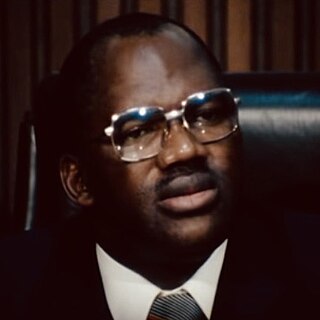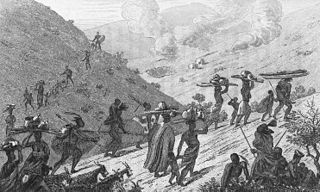
Transkei, officially the Republic of Transkei, was an unrecognised state in the southeastern region of South Africa from 1976 to 1994. It was, along with Ciskei, a Bantustan for the Xhosa people—and operated as a nominally independent parliamentary democracy. Its capital was Umtata.

A Bantustan was a territory that the National Party administration of South Africa set aside for black inhabitants of South Africa and South West Africa, as part of its policy of apartheid. By extension, outside South Africa the term refers to regions that lack any real legitimacy, consisting often of several unconnected enclaves, or which have emerged from national or international gerrymandering.

Bhisho, alternatively rendered Bisho, is the capital of the Eastern Cape province in South Africa. The Office of the Premier, Provincial Legislature and many other government departments are headquartered in the town. The town, three kilometres from Qonce and 70 kilometres from East London, is also part of Buffalo City.

Ciskei was a Bantustan for the Xhosa people-located in the southeast of South Africa. It covered an area of 7,700 square kilometres (3,000 sq mi), almost entirely surrounded by what was then the Cape Province, and possessed a small coastline along the shore of the Indian Ocean.

Lennox Leslie Wongama Ngweyesizwe Sebe was chief minister of the Xhosa bantustan of Ciskei after its self-rule in 1972, and the nominally independent country's first president from 1983. His praise name (isikhahlelo) was Ngweyesizwe Aa! Ngweyesizwe!.
Joshua Oupa Gqozo was the military ruler of the former homeland of Ciskei in South Africa.

The amaMfengu was a reference of Xhosa clans whose ancestors were refugees that fled from the Mfecane in the early-mid 19th century to seek land and protection from the Xhosa. These refugees were assimilated into the Xhosa nation and were officially recognized by the then king, Hintsa. The term derives from the Xhosa verb "ukumfenguza" which means to wander about seeking service.
Chief Justice Thandathu Jongilizwe Mabandla known as Chief Justice Mabandla was a Xhosa chief from Alice in Eastern Cape.

The Ciskei Defence Force (CDF) was established during March 1981 from the 141 Battalion of the South African Defence Force (SADF). It was the defence force of Ciskei, a bantustan that was controlled by the apartheid regime of South Africa. The CDF functioned as part of the 21 Battalion based near Lenasia, outside Johannesburg.
The Rharhabe House is the second senior house of the Xhosa Kingdom. Its royal palace is in the former Ciskei and its counterpart in the former Transkei is the Gcaleka, which is the great house of Phalo.
Sipho Mangindi Burns-NcamasheAa! Zilimbola! (1920–1996) was a South African poet, short story writer and Xhosa imbongi. He was also the chief of the AmaGwali Xhosa sub-group in Alice. He was also the leader of the Ciskei National Unionist Party from 1972–1978, the only member from his party to get a seat in the Republic of Ciskei National Assembly, until 1978 when he joined the Ciskei opposition party, the Ciskei National Party led by Chief Justice Mabandla. In 1979, Ciskei officially became a one-party state under the rule of Lennox Sebe and Burns-Ncamashe remained as one of the members of the Ciskei National Assembly.
The Vice President of Ciskei was a political position in that republic. The Vice President was appointed as a deputy by the President.
Parliamentary elections were held in Ciskei between 19 and 23 February 1973. As there were no political parties at the time, all candidates ran as independents.

Thornhill is a rural village in Enoch Mgijima Local Municipality under the Chris Hani District Municipality in the Eastern Cape province of South Africa. Under the previous political dispensation it fell in the Ciskei homeland. Thornhill is the biggest village in the [Ntabethemba].

The Transkei Defence Force (TDF) was established during March 1981, from the 141 Battalion of the South African Defence Force (SADF). It was the defence force of the Republic of Transkei, a nominally independent bantustan during the Apartheid era of South Africa.
Lt. General Xhanti Charles Sebe was leader of the Ciskei Defence Force- the military of the Bantustan of Ciskei, and its Director of State Security. A former Security Branch policeman, he later joined the South African Bureau of State Security (B.O.S.S.) before founding the Ciskei state security apparatus.

The National Monument of the Republic of Ciskei: Ntaba kaNdoda is located in Dimbaza, South Africa. It was commissioned by President of Ciskei Lennox Sebe, and was opened by him on August 14, 1981. The memorial was created with the intention of commemorating those Xhosa chiefs who died in the dispute with the white colonizers over land use rights.

The 1990 Ciskei coup d'état was a bloodless military coup in Ciskei, an unrecognised state and a nominally independent South African homeland for the Xhosa people, which took place on 4 March 1990. The coup was led by the then 37-year-old Brigadier Oupa Gqozo, the Chief of Staff Intelligence of the Ciskei Defence Force, against the government of President for Life Lennox Sebe (CNIP), who was on a state visit to Hong Kong at the time. The coup was followed by widespread rioting and looting, prompting Gqozo to request that the South African government send SADF troops to help restore order.
The Ciskei National Independence Party (CNIP) was a political party in the nominally independent South African homeland of Ciskei. It was founded and led by Lennox Sebe. The party advocated cooperation with the South African government. The party governed Ciskei from 1973 until the 1990 coup d'état by Oupa Gqozo.










